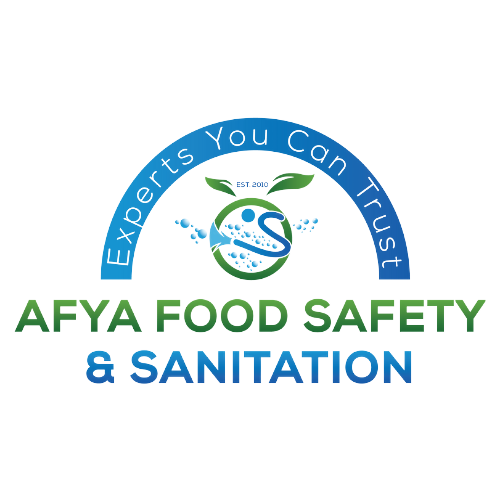
Please Wait For Loading

Please Wait For Loading
Maryland, MD USA
+1 (443) 666-9132
info@afyafoodsafety.com
Opening Hours: 9:00 AM - 5:00 PM
Copyright ©Afya Food Safety all rights reserved.
You can also reach us via Phone: +1 443 666 9132 or via Email:info@afyafoodsafety.com
A Clean Kitchen: 7 Tips to Ensuring Food Safety at Home
Every home’s kitchen serves as a meeting place for family gatherings, meal preparation, and the creation of memories. To guarantee food safety at home, sanitation must take precedence over the comfort and aroma of cooking. Maintaining a clean kitchen creates a healthy atmosphere and stops dangerous germs and pollutants from spreading. Read on as we discuss the value of keeping your kitchen spotless and offer helpful advice on improving food safety at home.
The Importance of a Clean Kitchen
A clean kitchen is vital for the following reasons:
Preventing Food-borne Illnesses:
A clean kitchen is the first line of defense against foodborne illnesses. Bacteria, viruses, and parasites can easily contaminate food, leading to stomachaches, nausea, and even more severe health issues. Regular cleaning, disinfecting, and proper food handling are essential in reducing the risk of such infections.
Preserving Food Quality:
Keeping a kitchen clean preserves food quality in addition to being safe. The cooked food is kept fresh and wholesome by proper storage, clean utensils, and discarding expired foods on time. This stops bacteria and mold from growing.
Creating a Positive Cooking Environment
A clean and organized kitchen provides a positive and inspiring cooking environment. It encourages creativity and fun during meal preparations. When the kitchen is clutter-free and well-maintained, it becomes a space where you can experiment with new recipes and flavors.
Practical Tips for a Clean Kitchen
Regular Cleaning Schedule – The first step in maintaining a clean kitchen is establishing a regular cleaning schedule. Clean kitchen surfaces such as counters and tables daily. Use vinegar and water mixture or a light detergent regularly to clean surfaces and appliances like microwaves, refrigerators, and ovens.
Proper Food Storage – Invest in airtight containers for storing perishable items in the refrigerator and pantry. Label and date leftovers to ensure you consume them before they spoil. Regularly check for expired items and dispose of them promptly to prevent the growth of harmful bacteria while managing your food inventory efficiently.
Mindful Dishwashing – The cleanliness of your dishes is as crucial as the cleanliness of your kitchen surfaces. Washing dishes, utensils, and cutting boards with hot, soapy water after use aids in eliminating disease-causing organisms. You are encouraged to use separate cutting boards for raw meat, poultry, and vegetables to avoid cross-contamination.
Careful Handling of Raw Meat: Foodborne infections are frequently found in raw meat. A lot of care should be taken when handling raw meat. When cooking meat, ensure it’s cooked all the way through. After handling raw meat, immediately wash your hands, utensils, and surfaces to stop the spread of bacteria.
Regular Trash Disposal: Trash cans are havens for bacteria and foul odors. To stop the growth of germs, empty the garbage frequently and give the bin a disinfectant cleaning. To lower the chance of infection, think about utilizing garbage bags with antimicrobial qualities.
Pest Control Measures: Pests like ants, cockroaches, and rodents are unsightly and can contaminate food. Seal cracks and gaps in walls, keep food in sealed containers, and clean up crumbs promptly. If infestation is noted, engage professional pest control services to maintain a pest-free kitchen environment.
Educate Your Family: Share the importance of a clean kitchen with your family members. Encourage everyone to wash hands before handling food, especially after using the restroom. Teach children about the significance of cleanliness in the kitchen and involve them in age-appropriate tasks to instill good habits from a young age.
Conclusion
An immaculately clean kitchen is visually appealing. By being proactive about cleanliness, creating regular cleaning schedules, and using safe food handling techniques, you can create a kitchen environment that promotes health, well-being, and the love of cooking. Remember that a tidy kitchen is a safe kitchen. This enhances a family’s quality of life and their passion for cooking.
Related Posts
Categories
Antibiotic Resistance: A Growing Threat to Food Safety
April 17, 2025Understanding Cross-Contamination: A Major Food Safety Risk
March 31, 2025Calender